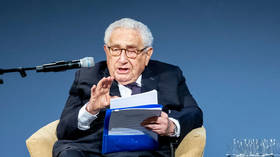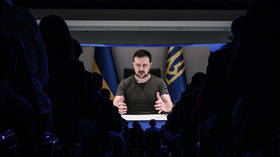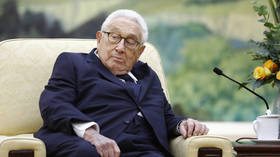West should take Moscow’s interests into account – Kissinger

The West should take Moscow’s interests into account to prevent Russia from becoming “an outpost of China in Europe,” former US Secretary of State Henry Kissinger has said.
In an interview with the Sunday Times, Kissinger hailed NATO’s united response to Russia’s military offensive in Ukraine and said the alliance should be maintained as it “has grown into an institution reflecting European and American collaboration in an almost unique way.”
The question will now be how to end that war. At its end a place has to be found for Ukraine and a place has to be found for Russia – if we don’t want Russia to become an outpost of China in Europe.
The refusal of China to condemn the Russian military offensive in Ukraine and its increasing cooperation with Moscow are the latest items in a long list of disagreements between Washington and Beijing. The US-led West responded to Russia’s “aggression” by imposing hard-hitting sanctions on Moscow.
Commenting on Russia’s military operation in Ukraine, the former secretary of state said that there was “no excuse” for what President Vladimir Putin has done. In his opinion, the Russian leader, whom he had always viewed as “a thoughtful analyst,” is the “head of a declining country” and “he’s lost his sense of proportion in this crisis.”
Kissinger argued that now, as Europe and America are facing “big issues” in their relations with the Middle East and Asia, it is not in the interest of the US to allow China to further build up its power.
“I do not believe that world domination is a Chinese concept, but it could happen that they become so powerful. And that’s not in our interest,” he said.
Kissinger has no doubts that Washington and Beijing are now adversaries but stresses the two superpowers “have a minimum common obligation” to prevent a catastrophic collision from happening. With some countries willing to exploit the rivalry and others seeking aid from one of the superpowers, “we’re heading into a very difficult period,” Kissinger warned.
On Sunday, Chinese Defense Minister Wei Fenghe said that his country was pursuing a path of peaceful development and was not seeking world hegemony. Noting that although China has achieved “significant progress” in nuclear arms development, the minister made it clear that Beijing sticks to a “self-defense policy.” His remarks came the day after US Secretary of Defense Lloyd Austin stressed that the US was not seeking confrontation with either China or any other countries in the Indo-Pacific region. However, Austin said that amid “growing coercion” from China and its “provocative and destabilizing military activity near Taiwan,” maintaining peace is not just in Washington’s interests but also “a matter of international concern.”
Following his speech at the World Economic Forum in Davos, Kissinger, who turned 99 in May, was labeled “an accomplice in the crimes of the Russian authorities” by the Mirotvorets website, which is commonly believed to be run by the Security Service of Ukraine (SBU).
In Davos, Kissinger said that a peace deal must be reached between Kiev and Moscow in the coming months to prevent the Ukraine conflict from spiraling into a global war between NATO and Russia. For this to happen, according to the former secretary of state, Ukraine must at least accept a return to the “status quo ante,” meaning it would need to relinquish its territorial claims to Crimea and grant autonomy to the Donetsk and Lugansk People’s Republics.
Kissinger is a prominent advocate of the realpolitik school of international relations, which puts the practical interests of nations ahead of ideological stances. As President Richard Nixon’s secretary of state, he spearheaded the US’ diplomatic outreach to China during the 1970s, which was aimed at preventing Beijing from allying itself with Soviet Russia.














